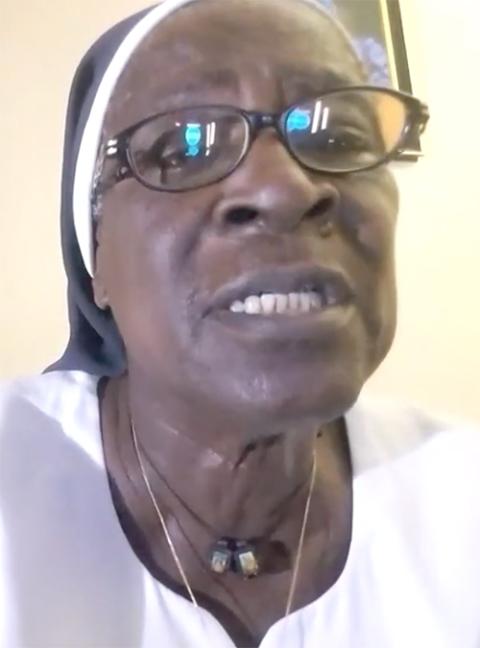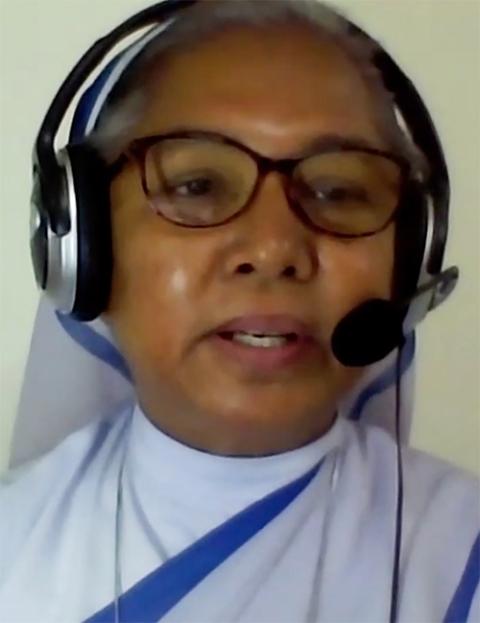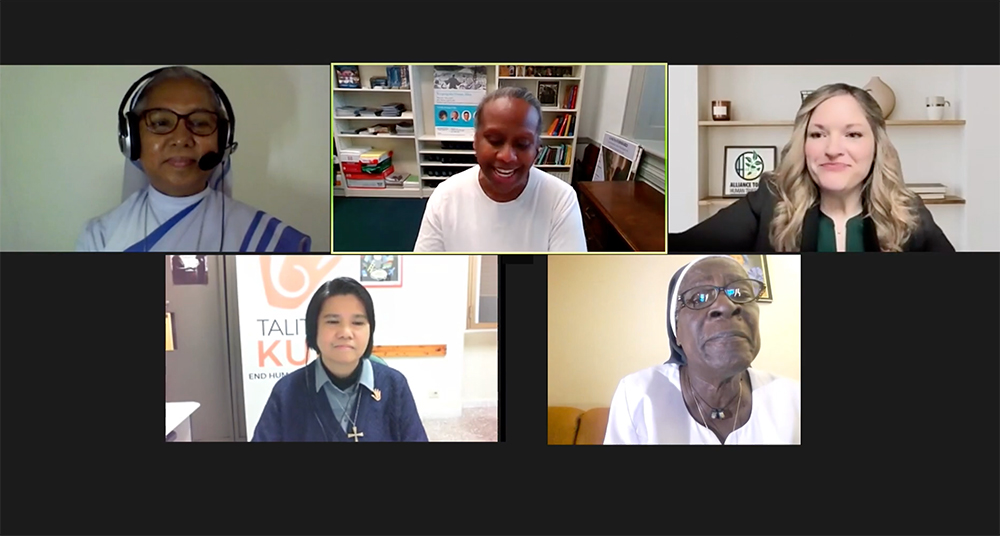
The March 6 "Catholic Sisters Working to Eradicate Human Trafficking" online panel was co-hosted by the Initiative on Catholic Social Thought and Public Life and the Berkley Center for Religion, Peace and World Affairs at Georgetown University. Top row, from left: Mary Immaculate of Nyeri Sr. Licia Puthuparambil, moderator Kimberly Mazyck, and Katie Boller Gosewisch. Bottom row: Maryknoll Sr. Abby Avelino, left, and St. Louis Sr. Patricia Ebegbulem. (GSR screenshot)
Sr. Patricia Ebegbulem, a member of the Sisters of St. Louis in Nigeria, vividly recalls what compelled her to battle human trafficking.
"We heard from our counterparts in Italy that many Nigerian women were in the streets of Italy in forced prostitution," Ebegbulem said.
Then president of her congregation, she immediately led a delegation to Italy to explore the situation.
"What we saw was totally against human dignity," remembered Ebegbulem, adding that this mobilized her congregation to create a shelter for human trafficking victims, with Ebegbulem now serving as a national leader on addressing the issue in her country. "It was horrendous. It was destructive."
Ebegbulem represents one of many sisters striving to aid the millions of trafficked individuals worldwide, as highlighted in an online panel discussion on the topic March 6, co-hosted by the Initiative on Catholic Social Thought and Public Life and the Berkley Center for Religion, Peace and World Affairs at Georgetown University in Washington, D.C.
The panel featured multiple sisters, including Ebegbulem, all working on the front lines to address and eliminate trafficking in different countries. Each shared heartbreaking trends, as well as potential steps to eradicate human trafficking.
"It's happening everywhere. It can happen to anyone," said Sr. Abby Avelino, a member of the Maryknoll Sisters and the international coordinator of Talitha Kum, the International Network of Consecrated Life Against Trafficking in Persons. "Everybody has a role to play to combat human trafficking."
The International Labor Organization estimated a total of 50 million human trafficking victims in 2022, said panel moderator Kimberly Mazyck, associate director of the Initiative on Catholic Social Thought and Public Life.
"It's difficult to quantify victims of human trafficking, because the crime is inherently underground," Mazyck said, dubbing human trafficking a modern form of slavery.
The speakers identified common forms of trafficking, including sexual and labor exploitation and human organ removal.
All reported that human traffickers largely prey upon migrants in vulnerable circumstances.
"Human trafficking is really a process, in which people are lured by a false prospect," said Avelino, who remains highly active with anti-trafficking activities in Japan.
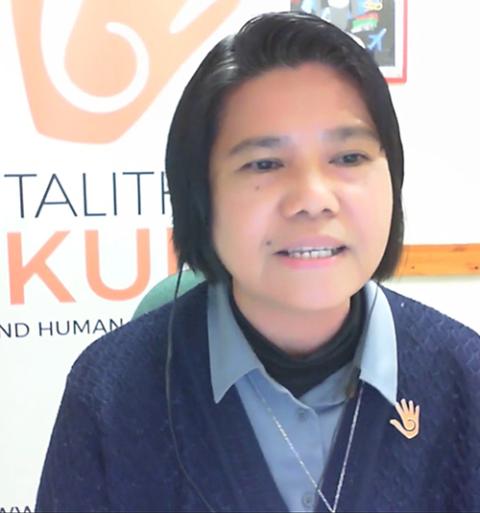
Maryknoll Sr. Abby Avelino (GSR screenshot)
With poverty and forced migration both major underlying factors of trafficking, she said, many victims she assists were recruited for job opportunities in a new country, only to be abducted upon arriving.
"They're migrants, refugees, people who move because they would like to find a better life," Avelino said. "The moment the person moved to Japan [and arrived at the] airport, they were moved and taken to a place where they never know where they are. Their passport was taken, and they were abused."
Many victims she aids are African migrants, she noted, who fled their native lands because of life-threatening conflicts there.
"They moved because they were in this place and were desperate, and ended up in the hands of traffickers," she said. She added that some manage to escape their traffickers, while her organization rescues others.
Ebegbulem hears similar stories among women in the shelter she oversees. Traffickers prove "criminally cunning" in luring women with offers "that look very real and proper," she said.
She also witnesses the crippling impact of trafficked women's exploitation, she added.
"I see how much they're traumatized," she said. "They're battered and shattered."
Advertisement
Many tragic trafficking patterns occur across India as well, said Sr. Licia Puthuparambil, a member of the Sisters of Mary Immaculate of Nyeri and a canon lawyer involved with anti-trafficking efforts there.
Traffickers convince numerous impoverished families to sell their children, she said.
"It will be less than $100 [traffickers] are promising, but for the economically poor, this is a huge amount of money," Puthuparambil said. "[The parents are told] these children will go to big cities, will work and send money to them."
Once traffickers purchase the children, however, they resell them into prostitution, cheap labor and for organ removal, she said.
Families who can't afford a dowry for their daughters are also lured by traffickers promising to find a suitable groom with no need for dowry, she added. They even pay parents thousands of rupees.
But instead of getting married, Puthuparambil said, "this poor child who is taken is sold into brothel houses."
For many of these women, she noted, their illiteracy prevents them from reaching out for help.
"Once they are exploited sexually, they try to become friendly with traffickers, and they do the trafficking in their turn," she said.
India also sees a new form of trafficking, she added, where young men woo Catholic girls and persuade them to elope.
"The next action is changing her religion, then he takes her and allows someone else to marry her and again sells her into a brothel," she said. "The saddest part of it is they are aiming at Catholic girls. They are educated women."
To break the cycle of trafficking, Puthuparambil's congregation goes "house to house" to counsel families about protecting and educating their daughters, she said. They also operate a facility providing free board and education for children, to prevent them from being trafficked.
Her congregation further offers job skills training for trafficking victims, she said, "so they can find means of living" and "don't have to depend on others."
Ebegbulem said she works to educate migrants about "migrating properly, with the correct documents, so that people don't take advantage of your vulnerability."
She also emphasized that worldwide, citizens of various countries must make an effort to "welcome migrants, accommodate migrants, empower migrants," so they don't fall prey to trafficking.
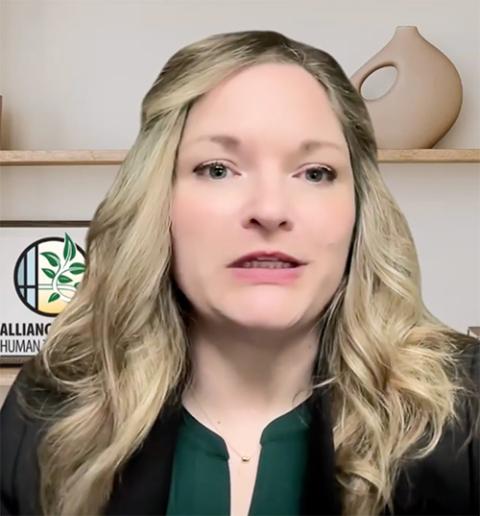
Katie Boller Gosewisch (GSR screenshot)
Katie Boller Gosewisch, executive director of the faith-based Alliance to End Human Trafficking, highlighted proposed legislation that could curb trafficking in the U.S.
This includes legislation to increase financial assistance for countries that many migrants flee from, she said, citing a Polaris Project report that found 77% of human trafficking victims in the U.S. are migrants.
Another piece of legislation would assist unaccompanied minors currently treated as adults in the migration system.
"We really want to get away from a situation where a 3-year-old is facing an immigration judge by themselves," Gosewisch said, noting that these children are highly vulnerable to trafficking.
Above all, Gosewisch encourages people to learn common signs of human trafficking — all discussed on her alliance's website — and to contact law enforcement about any they see.
"You might get it right," she said. "That could be the difference between life and death."

